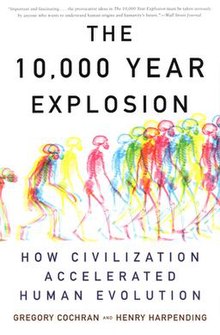The 10,000 Year Explosion
 |
|
| Authors | Gregory Cochran, Henry Harpending |
|---|---|
| Publisher | Basic Books |
|
Publication date
|
2009 |
| Media type | |
| Pages | 304 |
| ISBN | |
| 599.93'8-dc22 | |
| LC Class | GN281.4.c632 2009 |
The 10,000 Year Explosion: How Civilization Accelerated Human Evolution is a 2009 book by anthropologists Gregory Cochran and Henry Harpending. Starting with their own take on the conventional wisdom that the evolutionary process stopped when modern humans appeared, the authors explain the genetic basis of their view that human evolution is accelerating, illustrating it with some examples.
Cochran and Harpending put forward the idea that the development of agriculture has caused an enormous increase in the rate of human evolution, including numerous evolutionary adaptations to the different challenges and lifestyles that resulted. Moreover, they argue that these adaptations have varied across different human populations, depending on factors such as when the various groups developed agriculture, and the extent to which they mixed genetically with other population groups.
Such changes, they argue, include not just well-known physical and biological adaptations such as skin colour, disease resistance, and lactose tolerance, but also personality and cognitive adaptations that are starting to emerge from genetic research. These may include tendencies towards (for example) reduced physical strength, enhanced long-term planning, or increased docility, all of which may have been counter-productive in hunter-gatherer societies, but become favoured adaptations in a world of agriculture and its resulting trade, governments and urbanization. These adaptations are even more important in the modern world, and have helped shape today's nation states. The authors speculate that the scientific and Industrial Revolutions came about in part due to genetic changes in Europe over the past millennium, the absence of which had limited the progress of science in Ancient Greece. The authors suggest we would expect to see fewer adaptive changes among the Amerindians and sub-Saharan Africans, who have farmed for the shortest times and were genetically isolated from older civilizations by geographical barriers. In groups that had remained foragers, such as the Australian Aborigines, there would presumably be no such adaptations at all. This may explain why Indigenous Australians and many Native Americans have characteristic health problems when exposed to modern Western diets. Similarly, Amerindians, Aboriginals, and Polynesians, for example, had experienced very little infectious disease. They had not evolved immunities as did many Old World dwellers, and were decimated upon contact with the wider world.
...
Wikipedia
